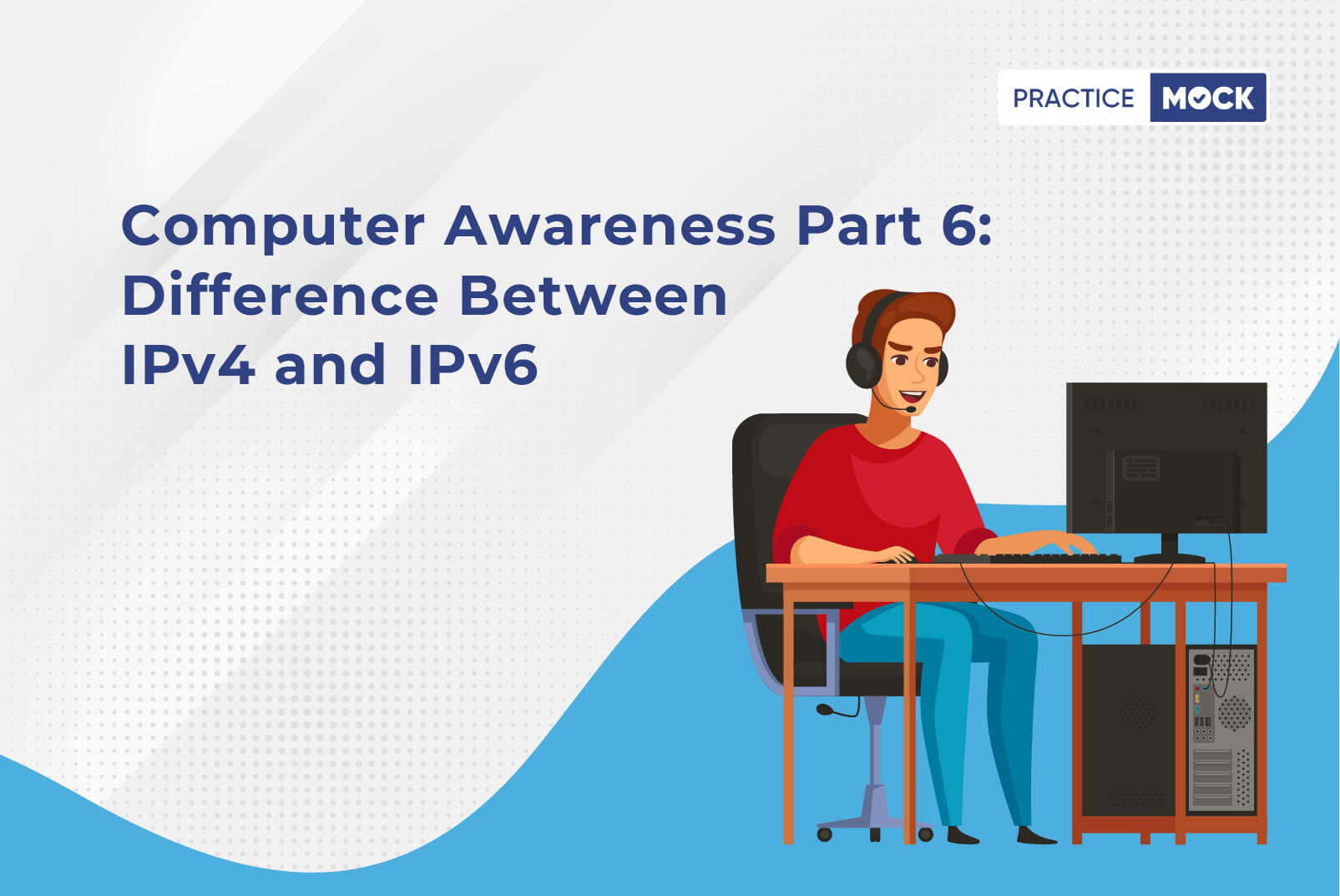The Internet Protocol (IP) is the network layer communications protocol in the Internet protocol suite that relays datagrams across network boundaries. Its enables internetworking through its routing function, and sets up the Internet.
The first major version of IP, Internet Protocol Version 4 (IPv4), is the dominant protocol of the Internet. Its successor is Internet Protocol Version 6 (IPv6), which has been in increasing deployment on the public Internet since c. 2006
You may also like to read: Computer Awareness-Part 5- Notepad vs WordPad

What is IPv4?
IPv4 or Internet Protocol version 4 is the underlying technology that connects our devices to the web. Every time our devices access the Internet, it is assigned a unique, numerical label such as 192.0.2.1. A data packet must be transferred across the network containing the IP addresses of both devices, to send data from one computer to another through the web.
Also read: Computer Awareness Part 5-Difference Between Search Engine & Web Browser
What is IPv6?
IPv6 is the next generation Internet Protocol (IP) address standard, which was intended to supplement by replacing IPv4. It is the protocol which many Internet services still use today. Every computer, mobile phone, home automation component, IoT sensor and any other device connected to the Internet needs a numerical IP address to communicate between other devices. IPv4, the original IP address scheme, which is running out of addresses because to its widespread usage from the proliferation of uncountable connected devices.
Also read, Computer Awareness Part 3-History of computers for All Bank Exams
Difference between IPv4 and IPv6
The major differences between IPv4 and IPv6 are:
| IPv4 (Internet Protocol Version 4) | IPv6 (Internet Protocol Version 6) |
| Encryption and authentication are not provided in IPv4 (Internet Protocol Version 4). | Encryption and authentication are provided in IPv6 (Internet Protocol Version 6) |
| Checksum field is available in IPv4. | Checksum field is not available in IPv6. |
| Header of IPv4 is 20 – 60 bytes. | Header of IPv6 is fixed at 40 bytes |
| Packet flow identification is not available in IPv4 (Internet Protocol Version 4). | Packet flow identification is available in IPv6. Flow label field is available in the header. |
| IPv4 addresses are usually represented in dot-decimal notation. It consists of four decimal numbers, each ranging from 0 to 255, which is separated by dots. | An IPv6 address is represented as eight groups of four hexadecimal digits. Each group represents 16 bits. |
| Sender and forwarding routers performs fragmentation in IPv4 | Fragmentation is performed only by the sender in IPv6. |
| In IPv4, security features rely on application | In IPv6, there is an inbuilt security feature named IPSEC. |
| End to end connection integrity cannot be achieved in IPv4. | End to end connection integrity can be done in IPv6. |
| IPv4 addresses are 32-bit long | IPv6 addresses are 128 bits long. |
| IPv4 supports DHCP and Manual address configuration | IPv6 supports renumbering and auto address configuration. |
| IPv4 has a broadcast message transmission scheme. | Multicast and Anycast message transmission scheme are available in IPv6. |
| The address space in IPv4 is 4.29 ×109 | The address space in IPv6 is 3.4 ×1038 |

You may also like to read: Computer Awareness Part 5-Computer Networks-Types & Functions
FAQs (Frequently Asked Questions) on IPv4 and IPV6
Q 1. What are IPv4 and IPv6?
Ans. IPv4 is the fourth version of the Internet Protocol (IP) and IPv6 is the mist latest version of IP.
Q 2. Which is better IPv4 or IPv6?
Ans. IPv6 is slightly better than IPv4. The 6th version of IP provided better results.
Q3. How is IPv4 addresses represented?
IPv4 addresses are usually represented in dot-decimal notation, consisting of four decimal numbers, each ranging from 0 to 255, separated by dots.
Q4. Is Multicast and Anycast message transmission scheme available in IPv6?
Yes. Multicast and Anycast message transmission scheme are available in IPv6.
Q5. Is the Checksum field available in IPv4 or in IPv6?
The checksum field is available in IPv4, whereas it is not available in IPv6.
[table “14” not found /]- Sign Up on Practicemock for Updated Current Affairs, Free Topic Tests and Free Mini Mocks
- Sign Up Here to Download Free Study Material
Free Mock Tests for the Upcoming Exams
- RRB PO 2024 Free Mock Test
- RRB Clerk 2024 Free Mock Test
- SSC MTS Free Mock Test
- SSC CHSL Free Mock Test
- SSC CGL Free Mock Test
- GATE Mechanical Free Mock Test
- GATE Civil Free Mock Test
- NABARD Gr. A Free Mock Test
- SBI Clerk Mains Free Mock Test
- SSC CPO Free Mock Test
- AFCAT Free Mock Test
- CAT Free Mock Test
- NIACL Assistant Free Mock Test
- UIIC AO Free Mock Test
- UIIC Assistant Free Mock Test
- GIC Assistant Manager Free Mock Test
- NICL AO Free Mock Test
- Free SSC Live Test
- UPSC CSAT Free Mock Test
- CDS-I Free Mock Test
- RRB ALP Free Mock Test


